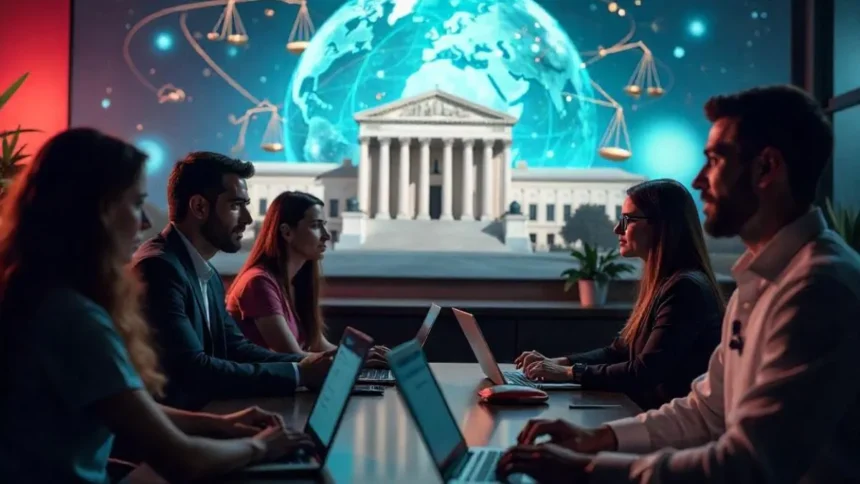In a democracy, the media is often regarded as the fourth estate, a pillar as critical as the legislative, executive, and judicial branches. Its role extends beyond mere information dissemination; it serves as a watchdog, a platform for public discourse, and a mechanism for ensuring accountability in governance.
Historical Context: The Origin of the Fourth Estate
1. The Concept of the Fourth Estate
The term “fourth estate” originated in 18th-century Britain, attributed to Edmund Burke. It highlighted the press’s influence as separate yet equally important to traditional power structures.
2. Media’s Role in Early Democracies
- American Revolution: Newspapers rallied public opinion against colonial rule.
- French Revolution: The free press championed liberty and equality.
These examples underscore the power of the media in shaping democratic ideals.
The Role of Media in Democracy
1. Watchdog Journalism
A free press monitors government actions, exposing corruption and malpractices.
- Example: Watergate scandal coverage by The Washington Post.
- Significance: Ensures accountability in governance.
2. Shaping Public Opinion
Media influences how citizens perceive policies, events, and leaders. Responsible journalism provides factual reporting, fostering an informed electorate.
3. Promoting Transparency
Media bridges the gap between the government and citizens by highlighting:
- Policy decisions.
- Legislative developments.
- Socio-political events.
4. Civic Engagement and Empowerment
Through debates, editorials, and interviews, media encourages active participation in democratic processes, enhancing civic engagement.
Responsibilities of the Media in a Democratic Setup
1. Ensuring Press Freedom
Press freedom is a cornerstone of democracy. It allows journalists to report without fear of censorship or persecution.
2. Upholding Media Ethics
Media ethics demand:
- Accuracy and fairness.
- Avoidance of sensationalism.
- Respect for privacy and dignity.
3. Information Dissemination
Media acts as a conduit for sharing crucial information about governance, elections, and public policies.
4. Representing Diverse Voices
A democratic media platform should reflect a variety of perspectives, giving marginalized groups a voice in public discourse.
Challenges Faced by Media as the Fourth Estate
1. Political Influence and Bias
Media houses often face pressure to align with political ideologies, compromising responsible journalism.
2. The Rise of Fake News
In the digital age, misinformation threatens the credibility of news platforms and influences public opinion negatively.
3. Economic Pressures
The dependence on advertising revenue impacts the editorial independence of media organizations.
4. Safety of Journalists
Threats and attacks on journalists undermine press freedom and discourage investigative reporting.
The Power of Media in Modern Democracies
1. Digital Media Revolution
Social media and online platforms have amplified media’s reach, enabling real-time updates and global connectivity.
2. Grassroots Journalism
The rise of citizen journalism ensures that local issues gain visibility, empowering communities to voice concerns.
3. Media’s Role in Crisis Reporting
During emergencies, such as natural disasters or pandemics, media facilitates timely information dissemination and relief coordination.
4. Media’s Impact on Elections
- Coverage of campaigns and debates shapes voter perceptions.
- Investigative reports reveal discrepancies, promoting transparency in democracy.
Balancing Media Power and Responsibility
1. Addressing Media Bias
- Encourage independent oversight bodies.
- Promote media literacy among citizens to discern bias.
2. Strengthening Media Accountability
Journalistic standards should be upheld to maintain credibility and trust.
3. Ensuring Safe Spaces for Journalists
Governments and institutions must safeguard journalists from harassment and violence.
The Future of Media as the Fourth Estate
1. Technological Advancements
Artificial Intelligence (AI) and data analytics are revolutionizing news reporting and audience engagement.
2. Collaborative Media Models
Partnerships between traditional and digital media can create sustainable journalism ecosystems.
3. Renewed Focus on Press Freedom
Global efforts are needed to combat censorship and promote the role of media in democracy worldwide.
Conclusion
The media, as the fourth estate, plays an indispensable role in upholding democratic values by ensuring transparency in governance, shaping public opinion, and fostering civic engagement. While challenges such as bias and misinformation persist, a commitment to media ethics and press freedom can help the media continue its vital mission as a pillar of democracy.







